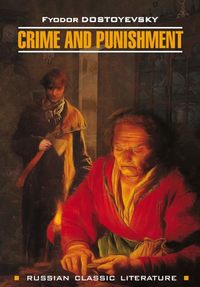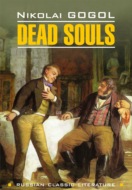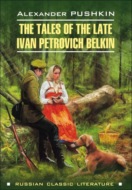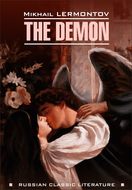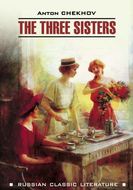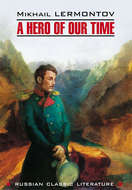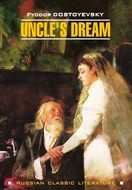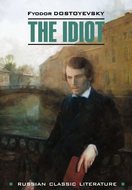Kitabı oku: «Crime And Punishment / Преступление и наказание», sayfa 5
CHAPTER V
“Of course, I’ve been meaning lately to go to Razumihin’s to ask for work, to ask him to get me lessons or something…” Raskolnikov thought, “but what help can he be to me now? Suppose he gets me lessons, suppose he shares his last farthing with me, if he has any farthings, so that I could get some boots and make myself tidy enough to give lessons… hm… Well and what then? What shall I do with the few coppers I earn? That’s not what I want now. It’s really absurd for me to go to Razumihin…”
The question why he was now going to Razumihin agitated him even more than he was himself aware; he kept uneasily seeking for some sinister significance in this apparently ordinary action.
“Could I have expected to set it all straight and to find a way out by means of Razumihin alone?” he asked himself in perplexity.
He pondered and rubbed his forehead, and, strange to say, after long musing, suddenly, as if it were spontaneously and by chance, a fantastic thought came into his head.
“Hm… to Razumihin’s,” he said all at once, calmly, as though he had reached a final determination. “I shall go to Razumihin’s of course, but… not now. I shall go to him… on the next day after It, when It will be over and everything will begin afresh…”
And suddenly he realised what he was thinking.
“After It,” he shouted, jumping up from the seat, “but is It really going to happen? Is it possible it really will happen?” He left the seat, and went off almost at a run; he meant to turn back, homewards, but the thought of going home suddenly filled him with intense loathing; in that hole, in that awful little cupboard of his, all this had for a month past been growing up in him; and he walked on at random.
His nervous shudder had passed into a fever that made him feel shivering; in spite of the heat he felt cold. With a kind of effort he began almost unconsciously, from some inner craving, to stare at all the objects before him, as though looking for something to distract his attention; but he did not succeed, and kept dropping every moment into brooding. When with a start he lifted his head again and looked round, he forgot at once what he had just been thinking about and even where he was going. In this way he walked right across Vassilyevsky Ostrov, came out on to the Lesser Neva, crossed the bridge and turned towards the islands. The greenness and freshness were at first restful to his weary eyes after the dust of the town and the huge houses that hemmed him in and weighed upon him. Here there were no taverns, no stifling closeness, no stench. But soon these new pleasant sensations passed into morbid irritability. Sometimes he stood still before a brightly painted summer villa standing among green foliage, he gazed through the fence, he saw in the distance smartly dressed women on the verandahs and balconies, and children running in the gardens. The flowers especially caught his attention; he gazed at them longer than at anything. He was met, too, by luxurious carriages and by men and women on horseback; he watched them with curious eyes and forgot about them before they had vanished from his sight. Once he stood still and counted his money; he found he had thirty copecks. “Twenty to the policeman, three to Nastasya for the letter, so I must have given forty-seven or fifty to the Marmeladovs yesterday,” he thought, reckoning it up for some unknown reason, but he soon forgot with what object he had taken the money out of his pocket. He recalled it on passing an eating-house or tavern, and felt that he was hungry… Going into the tavern he drank a glass of vodka and ate a pie of some sort. He finished eating it as he walked away. It was a long while since he had taken vodka and it had an effect upon him at once, though he only drank a wineglassful. His legs felt suddenly heavy and a great drowsiness came upon him. He turned homewards, but reaching Petrovsky Ostrov he stopped completely exhausted, turned off the road into the bushes, sank down upon the grass and instantly fell asleep.
In a morbid condition of the brain, dreams often have a singular actuality, vividness, and extraordinary semblance of reality. At times monstrous images are created, but the setting and the whole picture are so truth-like and filled with details so delicate, so unexpectedly, but so artistically consistent, that the dreamer, were he an artist like Pushkin or Turgenev even, could never have invented them in the waking state. Such sick dreams always remain long in the memory and make a powerful impression on the overwrought and deranged nervous system.
Raskolnikov had a fearful dream. He dreamt he was back in his childhood in the little town of his birth. He was a child about seven years old, walking into the country with his father on the evening of a holiday. It was a grey and heavy day, the country was exactly as he remembered it; indeed he recalled it far more vividly in his dream than he had done in memory. The little town stood on a level flat as bare as the hand, not even a willow near it; only in the far distance, a copse lay, a dark blur on the very edge of the horizon. A few paces beyond the last market garden stood a tavern, a big tavern, which had always aroused in him a feeling of aversion, even of fear, when he walked by it with his father. There was always a crowd there, always shouting, laughter and abuse, hideous hoarse singing and often fighting. Drunken and horrible-looking figures were hanging about the tavern. He used to cling close to his father, trembling all over when he met them. Near the tavern the road became a dusty track, the dust of which was always black. It was a winding road, and about a hundred paces further on, it turned to the right to the graveyard. In the middle of the graveyard stood a stone church with a green cupola where he used to go to mass two or three times a year with his father and mother, when a service was held in memory of his grandmother, who had long been dead, and whom he had never seen. On these occasions they used to take on a white dish tied up in a table napkin a special sort of rice pudding with raisins stuck in it in the shape of a cross. He loved that church, the old-fashioned, unadorned ikons and the old priest with the shaking head. Near his grandmother’s grave, which was marked by a stone, was the little grave of his younger brother who had died at six months old. He did not remember him at all, but he had been told about his little brother, and whenever he visited the graveyard he used religiously and reverently to cross himself and to bow down and kiss the little grave. And now he dreamt that he was walking with his father past the tavern on the way to the graveyard; he was holding his father’s hand and looking with dread at the tavern. A peculiar circumstance attracted his attention: there seemed to be some kind of festivity going on, there were crowds of gaily dressed townspeople, peasant women, their husbands, and riff-raff of all sorts, all singing and all more or less drunk. Near the entrance of the tavern stood a cart, but a strange cart. It was one of those big carts usually drawn by heavy cart-horses and laden with casks of wine or other heavy goods. He always liked looking at those great cart-horses, with their long manes, thick legs, and slow even pace, drawing along a perfect mountain with no appearance of effort, as though it were easier going with a load than without it. But now, strange to say, in the shafts of such a cart he saw a thin little sorrel beast, one of those peasants’ nags which he had often seen straining their utmost under a heavy load of wood or hay, especially when the wheels were stuck in the mud or in a rut. And the peasants would beat them so cruelly, sometimes even about the nose and eyes, and he felt so sorry, so sorry for them that he almost cried, and his mother always used to take him away from the window. All of a sudden there was a great uproar of shouting, singing and the balalaika, and from the tavern a number of big and very drunken peasants came out, wearing red and blue shirts and coats thrown over their shoulders.
“Get in, get in!” shouted one of them, a young thick-necked peasant with a fleshy face red as a carrot. “I’ll take you all, get in!”
But at once there was an outbreak of laughter and exclamations in the crowd.
“Take us all with a beast like that!”
“Why, Mikolka, are you crazy to put a nag like that in such a cart?”
“And this mare is twenty if she is a day, mates!”
“Get in, I’ll take you all,” Mikolka shouted again, leaping first into the cart, seizing the reins and standing straight up in front. “The bay has gone with Matvey,” he shouted from the cart – “and this brute, mates, is just breaking my heart, I feel as if I could kill her. She’s just eating her head off. Get in, I tell you! I’ll make her gallop! She’ll gallop!” and he picked up the whip, preparing himself with relish to flog the little mare.
“Get in! Come along!” The crowd laughed. “D’you hear, she’ll gallop!”
“Gallop indeed! She has not had a gallop in her for the last ten years!”
“She’ll jog along!”
“Don’t you mind her, mates, bring a whip each of you, get ready!”
“All right! Give it to her!”
They all clambered into Mikolka’s cart, laughing and making jokes. Six men got in and there was still room for more. They hauled in a fat, rosy-cheeked woman. She was dressed in red cotton, in a pointed, beaded headdress and thick leather shoes; she was cracking nuts and laughing. The crowd round them was laughing too and indeed, how could they help laughing? That wretched nag was to drag all the cartload of them at a gallop! Two young fellows in the cart were just getting whips ready to help Mikolka. With the cry of “now,” the mare tugged with all her might, but far from galloping, could scarcely move forward; she struggled with her legs, gasping and shrinking from the blows of the three whips which were showered upon her like hail. The laughter in the cart and in the crowd was redoubled, but Mikolka flew into a rage and furiously thrashed the mare, as though he supposed she really could gallop.
“Let me get in, too, mates,” shouted a young man in the crowd whose appetite was aroused.
“Get in, all get in,” cried Mikolka, “she will draw you all. I’ll beat her to death!” And he thrashed and thrashed at the mare, beside himself with fury.
“Father, father,” he cried, “father, what are they doing? Father, they are beating the poor horse!”
“Come along, come along!” said his father. “They are drunken and foolish, they are in fun; come away, don’t look!” and he tried to draw him away, but he tore himself away from his hand, and, beside himself with horror, ran to the horse. The poor beast was in a bad way. She was gasping, standing still, then tugging again and almost falling.
“Beat her to death,” cried Mikolka, “it’s come to that. I’ll do for her!”
“What are you about, are you a Christian, you devil?” shouted an old man in the crowd.
“Did anyone ever see the like? A wretched nag like that pulling such a cartload,” said another.
“You’ll kill her,” shouted the third.
“Don’t meddle! It’s my property, I’ll do what I choose. Get in, more of you! Get in, all of you! I will have her go at a gallop!…”
All at once laughter broke into a roar and covered everything: the mare, roused by the shower of blows, began feebly kicking. Even the old man could not help smiling. To think of a wretched little beast like that trying to kick!
Two lads in the crowd snatched up whips and ran to the mare to beat her about the ribs. One ran each side.
“Hit her in the face, in the eyes, in the eyes,” cried Mikolka.
“Give us a song, mates,” shouted someone in the cart and everyone in the cart joined in a riotous song, jingling a tambourine and whistling. The woman went on cracking nuts and laughing.
… He ran beside the mare, ran in front of her, saw her being whipped across the eyes, right in the eyes! He was crying, he felt choking, his tears were streaming. One of the men gave him a cut with the whip across the face, he did not feel it. Wringing his hands and screaming, he rushed up to the grey-headed old man with the grey beard, who was shaking his head in disapproval. One woman seized him by the hand and would have taken him away, but he tore himself from her and ran back to the mare. She was almost at the last gasp, but began kicking once more.
“I’ll teach you to kick,” Mikolka shouted ferociously. He threw down the whip, bent forward and picked up from the bottom of the cart a long, thick shaft, he took hold of one end with both hands and with an effort brandished it over the mare.
“He’ll crush her,” was shouted round him. “He’ll kill her!”
“It’s my property,” shouted Mikolka and brought the shaft down with a swinging blow. There was a sound of a heavy thud.
“Thrash her, thrash her! Why have you stopped?” shouted voices in the crowd.
And Mikolka swung the shaft a second time and it fell a second time on the spine of the luckless mare. She sank back on her haunches, but lurched forward and tugged forward with all her force, tugged first on one side and then on the other, trying to move the cart. But the six whips were attacking her in all directions, and the shaft was raised again and fell upon her a third time, then a fourth, with heavy measured blows. Mikolka was in a fury that he could not kill her at one blow.
“She’s a tough one,” was shouted in the crowd.
“She’ll fall in a minute, mates, there will soon be an end of her,” said an admiring spectator in the crowd.
“Fetch an axe to her! Finish her off,” shouted a third.
“I’ll show you! Stand off,” Mikolka screamed frantically; he threw down the shaft, stooped down in the cart and picked up an iron crowbar. “Look out,” he shouted, and with all his might he dealt a stunning blow at the poor mare. The blow fell; the mare staggered, sank back, tried to pull, but the bar fell again with a swinging blow on her back and she fell on the ground like a log.
“Finish her off,” shouted Mikolka and he leapt beside himself, out of the cart. Several young men, also flushed with drink, seized anything they could come across – whips, sticks, poles, and ran to the dying mare. Mikolka stood on one side and began dealing random blows with the crowbar. The mare stretched out her head, drew a long breath and died.
“You butchered her,” someone shouted in the crowd.
“Why wouldn’t she gallop then?”
“My property!” shouted Mikolka, with bloodshot eyes, brandishing the bar in his hands. He stood as though regretting that he had nothing more to beat.
“No mistake about it, you are not a Christian,” many voices were shouting in the crowd.
But the poor boy, beside himself, made his way, screaming, through the crowd to the sorrel nag, put his arms round her bleeding dead head and kissed it, kissed the eyes and kissed the lips… Then he jumped up and flew in a frenzy with his little fists out at Mikolka. At that instant his father, who had been running after him, snatched him up and carried him out of the crowd.
“Come along, come! Let us go home,” he said to him.
“Father! Why did they… kill… the poor horse!” he sobbed, but his voice broke and the words came in shrieks from his panting chest.
“They are drunk… They are brutal… it’s not our business!” said his father. He put his arms round his father but he felt choked, choked. He tried to draw a breath, to cry out – and woke up.
He waked up, gasping for breath, his hair soaked with perspiration, and stood up in terror.
“Thank God, that was only a dream,” he said, sitting down under a tree and drawing deep breaths. “But what is it? Is it some fever coming on? Such a hideous dream!”
He felt utterly broken: darkness and confusion were in his soul. He rested his elbows on his knees and leaned his head on his hands.
“Good God!” he cried, “can it be, can it be, that I shall really take an axe, that I shall strike her on the head, split her skull open… that I shall tread in the sticky warm blood, break the lock, steal and tremble; hide, all spattered in the blood… with the axe… Good God, can it be?”
He was shaking like a leaf as he said this.
“But why am I going on like this?” he continued, sitting up again, as it were in profound amazement. “I knew that I could never bring myself to it, so what have I been torturing myself for till now? Yesterday, yesterday, when I went to make that… expériment, yesterday I realised completely that I could never bear to do it… Why am I going over it again, then? Why am I hesitating? As I came down the stairs yesterday, I said myself that it was base, loathsome, vile, vile… the very thought of it made me feel sick and filled me with horror.
“No, I couldn’t do it, I couldn’t do it! Granted, granted that there is no flaw in all that reasoning, that all that I have concluded this last month is clear as day, true as arithmetic… My God! Anyway I couldn’t bring myself to it! I couldn’t do it, I couldn’t do it! Why, why then am I still…?”
He rose to his feet, looked round in wonder as though surprised at finding himself in this place, and went towards the bridge. He was pale, his eyes glowed, he was exhausted in every limb, but he seemed suddenly to breathe more easily. He felt he had cast off that fearful burden that had so long been weighing upon him, and all at once there was a sense of relief and peace in his soul. “Lord,” he prayed, “show me my path – I renounce that accursed… dream of mine.”
Crossing the bridge, he gazed quietly and calmly at the Neva, at the glowing red sun setting in the glowing sky. In spite of his weakness he was not conscious of fatigue. It was as though an abscess that had been forming for a month past in his heart had suddenly broken. Freedom, freedom! He was free from that spell, that sorcery, that obsession!
Later on, when he recalled that time and all that happened to him during those days, minute by minute, point by point, he was superstitiously impressed by one circumstance, which, though in itself not very exceptional, always seemed to him afterwards the predestined turning-point of his fate. He could never understand and explain to himself why, when he was tired and worn out, when it would have been more convenient for him to go home by the shortest and most direct way, he had returned by the Hay Market where he had no need to go. It was obviously and quite unnecessarily out of his way, though not much so. It is true that it happened to him dozens of times to return home without noticing what streets he passed through. But why, he was always asking himself, why had such an important, such a decisive and at the same time such an absolutely chance meeting happened in the Hay Market (where he had moreover no reason to go) at the very hour, the very minute of his life when he was just in the very mood and in the very circumstances in which that meeting was able to exert the gravest and most decisive influence on his whole destiny? As though it had been lying in wait for him on purpose!
It was about nine o’clock when he crossed the Hay Market. At the tables and the barrows, at the booths and the shops, all the market people were closing their establishments or clearing away and packing up their wares and, like their customers, were going home. Rag pickers and costermongers of all kinds were crowding round the taverns in the dirty and stinking courtyards of the Hay Market. Raskolnikov particularly liked this place and the neighbouring alleys, when he wandered aimlessly in the streets. Here his rags did not attract contemptuous attention, and one could walk about in any attire without scandalising people. At the corner of an alley a huckster and his wife had two tables set out with tapes, thread, cotton handkerchiefs, etc. They, too, had got up to go home, but were lingering in conversation with a friend, who had just come up to them. This friend was Lizaveta Ivanovna, or, as everyone called her, Lizaveta, the younger sister of the old pawnbroker, Alyona Ivanovna, whom Raskolnikov had visited the previous day to pawn his watch and make his expériment… He already knew all about Lizaveta and she knew him a little too. She was a single woman of about thirty-five, tall, clumsy, timid, submissive and almost idiotic. She was a complete slave and went in fear and trembling of her sister, who made her work day and night, and even beat her. She was standing with a bundle before the huckster and his wife, listening earnestly and doubtfully. They were talking of something with special warmth. The moment Raskolnikov caught sight of her, he was overcome by a strange sensation as it were of intense astonishment, though there was nothing astonishing about this meeting.
“You could make up your mind for yourself, Lizaveta Ivanovna,” the huckster was saying aloud. “Come round to-morrow about seven. They will be here too.”
“To-morrow?” said Lizaveta slowly and thoughtfully, as though unable to make up her mind.
“Upon my word, what a fright you are in of Alyona Ivanovna,” gabbled the huckster’s wife, a lively little woman. “I look at you, you are like some little babe. And she is not your own sister either-nothing but a step-sister and what a hand she keeps over you!”
“But this time don’t say a word to Alyona Ivanovna,” her husband interrupted; “that’s my advice, but come round to us without asking. It will be worth your while. Later on your sister herself may have a notion.”
“Am I to come?”
“About seven o’clock to-morrow. And they will be here. You will be able to decide for yourself.”
“And we’ll have a cup of tea,” added his wife.
“All right, I’ll come,” said Lizaveta, still pondering, and she began slowly moving away.
Raskolnikov had just passed and heard no more. He passed softly, unnoticed, trying not to miss a word. His first amazement was followed by a thrill of horror, like a shiver running down his spine. He had learnt, he had suddenly quite unexpectedly learnt, that the next day at seven o’clock Lizaveta, the old woman’s sister and only companion, would be away from home and that therefore at seven o’clock precisely the old woman would be left alone.
He was only a few steps from his lodging. He went in like a man condemned to death. He thought of nothing and was incapable of thinking; but he felt suddenly in his whole being that he had no more freedom of thought, no will, and that everything was suddenly and irrevocably decided.
Certainly, if he had to wait whole years for a suitable opportunity, he could not reckon on a more certain step towards the success of the plan than that which had just presented itself. In any case, it would have been difficult to find out beforehand and with certainty, with greater exactness and less risk, and without dangerous inquiries and investigations, that next day at a certain time an old woman, on whose life an attempt was contemplated, would be at home and entirely alone.
